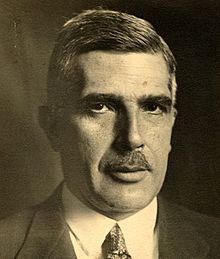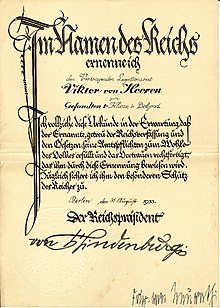Viktor von Heeren
Georg Maximilian Viktor "Vicky" von Heeren (born October 14, 1881 in Hamburg , † July 6, 1949 in Rottenbuch , Upper Bavaria ) was a German diplomat , lawyer and officer . He became known as the envoy of the German Reich in Yugoslavia from 1933 to 1941.
Life
Childhood, youth, training and military service
Viktor von Heeren was born in Hamburg on October 14, 1881. His father was Johann Hermann von Heeren , lawyer and envoy of the free Hanseatic cities in France, his mother was his cousin Maria del Carmen Augusta Ramona Tomasa Heeren y Massa (1849-1924).
From 1896 to 1900 Viktor von Heeren attended the Wilhelmsgymnasium in Munich . After graduating from school he studied law in Munich , Friborg and Strasbourg from 1900 and passed his legal traineeship in 1904 . From October 1904 to September 1905 he did military service as a one-year volunteer and began training as an officer in order to then work in the judicial and administrative service of the realm of Alsace-Lorraine . In 1909 von Heeren was appointed lieutenant in the reserve , in 1910 he passed his assessor examination and at the end of 1913 became an administrative assistant for the civil governor in Alsace-Lorraine. He took part in the First World War from August 1914 to January 1917, in March 1915 he was made First Lieutenant of the Reserve and in April 1917 Rittmeister of the Reserve of the Royal Bavarian Heavy Rider Regiment “Archduke Franz Ferdinand of Austria” stationed in Landshut . Este "No. 2 appointed. Towards the end of the war, Viktor von Heeren was district director in Saargemünd in Lorraine in 1917/18 , and in 1920 he worked briefly for the Reich Commissioner for Public Order Monitoring .
Diplomatic service
In October 1920 von Heeren was called up to the foreign trade department of the Foreign Office in Berlin and began his career as a diplomat. In 1921 he was appointed legation councilor and transferred to the German embassy in Madrid , where he took over the management of the consular department. In May 1921 he was promoted to Legation Council II class. In 1923 von Heeren married Elisabeth Freiin von Maltzahn (1894–1970), with whom he had three children. Shortly after his marriage, he returned to the Foreign Office in Berlin, where he worked in the cultural department in the area of German Abroad. In May 1925 Viktor von Heeren was transferred to Prague as envoy , where he worked until March 1929. From 1929 to 1933 he worked again in the Foreign Office, Department for Western and South-Eastern Europe. In 1929 von Heeren was appointed Legation Councilor First Class, in 1930 he was appointed Legation Councilor.
In 1933 he was sent to the German diplomatic mission in Belgrade ; as the top diplomat on site, he represented the German Empire in the Kingdom of Yugoslavia . In 1937 von Heeren joined the NSDAP , but did not take on any function within the party. In 1941, during the Second World War , Yugoslavia signed the three-power pact under German pressure, but a few days later a coup of Allied generals followed. The National Socialist leadership then decided to invade Yugoslavia . Viktor von Heeren, who, contrary to Ribbentrop's instructions, had kept contact with the new Yugoslav government, was opposed to the planned declaration of war. After unsuccessful protests in Berlin and the attempt to convince Yugoslavia to demobilize in order to prevent the war, he left Belgrade and was put on a temporary “waiting stand”.
After the end of the war von Heeren was briefly taken prisoner of war ; In 1947/48 he was rehabilitated after a denazification process. He died in July 1949 in Rottenbuch at a blood poisoning due to contaminated blood transfusion to treat leukemia and anemia , which he had previously been ill. Heeren was buried in the family grave in the Rottenbuch cemetery in Upper Bavaria.
Awards
- Iron Cross (1914) 1st Class, Munich on October 28, 1921, Bavarian Military District Command VII
- Cross of honor for combatants at the front , awarded by the Reich Minister of the Foreign Office, Berlin on March 19, 1935
- Decoration of honor of the German Red Cross 1st class, Berlin on June 7, 1937, awarded by Carl Eduard, Duke of Saxe-Coburg and Gotha
- Grand Cross of the St. Sava Order , Belgrade 1937
- Silver Medal of Honor in recognition of 25 years of service, signed by Otto Meissner , Berlin, January 9, 1939
literature
- Maria Keipert (Red.): Biographical Handbook of the German Foreign Service 1871–1945. Published by the Foreign Office, Historical Service. Volume 2: Gerhard Keiper, Martin Kröger: G – K. Schöningh, Paderborn et al. 2005, ISBN 3-506-71841-X .
- Ivo Tasovac: American Foreign Policy and Yugoslavia, 1939–1941. Texas A&M University Press, College Station TX 1999, ISBN 0-89096-897-7 , pp. 135-136, 31, 75-76, 99, 103, 133, 66 ( Eastern European Studies 11).
Web links
- Viktor von Heeren in the online version of the Reich Chancellery Files Edition . Weimar Republic
- Family tree
- History of the German Embassy in Madrid
| personal data | |
|---|---|
| SURNAME | Heeren, Viktor von |
| ALTERNATIVE NAMES | Heeren, Georg Maximilian Viktor von; Heeren, Vicky von |
| BRIEF DESCRIPTION | German diplomat, lawyer and officer; Envoy to Madrid, Prague and Belgrade |
| DATE OF BIRTH | October 14, 1881 |
| PLACE OF BIRTH | Hamburg |
| DATE OF DEATH | July 6, 1949 |
| Place of death | Rottenbuch , Upper Bavaria |

